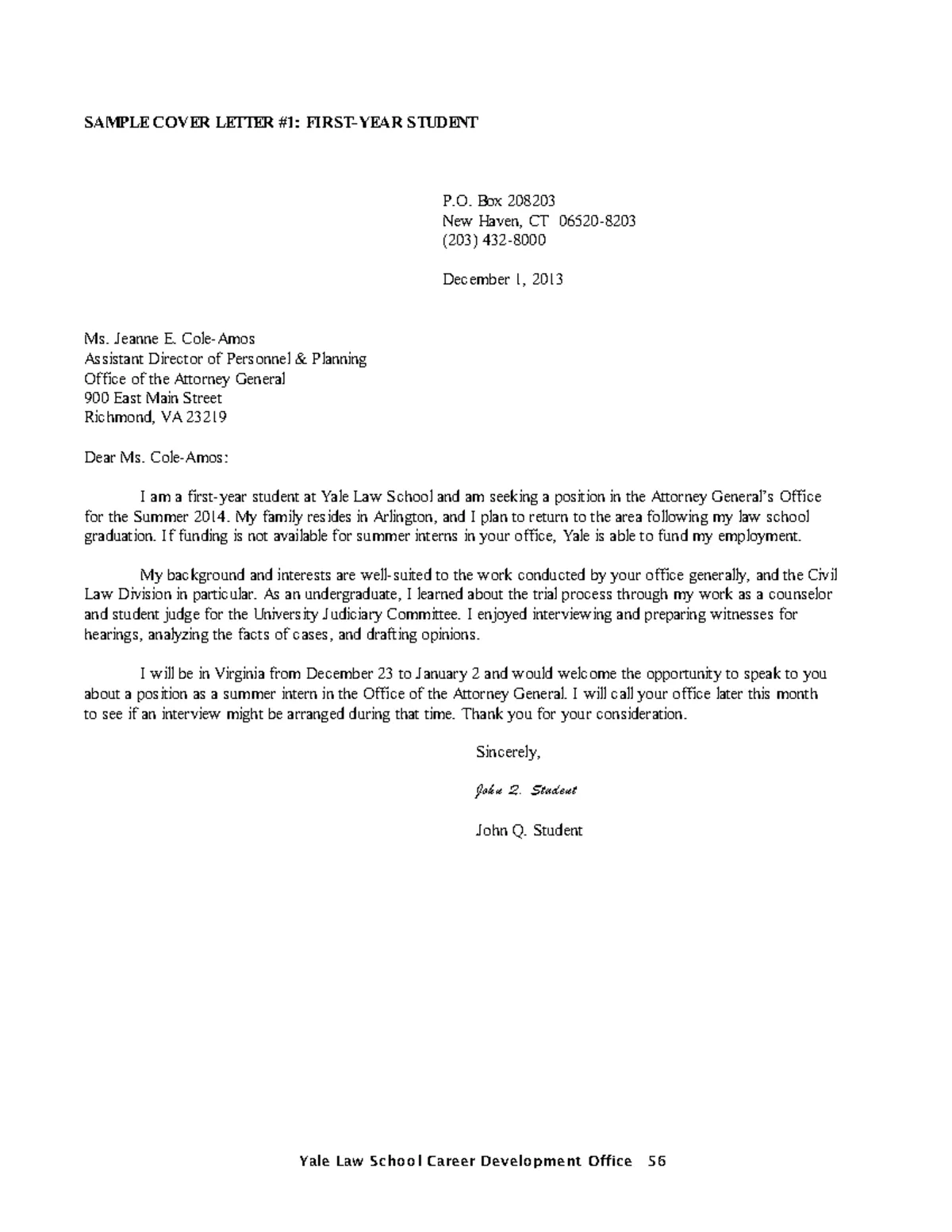Why a Strong Cover Letter Matters
A cover letter is your first impression, a crucial introduction that can significantly impact your chances of securing a law firm internship. Unlike a resume, which provides a snapshot of your qualifications, a cover letter allows you to express your personality, demonstrate your genuine interest, and showcase how your skills align with the specific requirements of the internship. It’s an opportunity to explain why you are the perfect fit, beyond just listing your accomplishments. A well-crafted cover letter can elevate your application, making you stand out from the competition, and prompting the hiring manager to delve deeper into your resume. A weak or generic cover letter, on the other hand, can be a deal-breaker, immediately leading to your application being overlooked.
Understanding Law Firm Internship Requirements
Before you start writing, carefully review the internship description. Understand the firm’s expectations, the required skills, and the responsibilities involved. Identify the qualities and qualifications they are seeking in an intern. Are they looking for strong research abilities, excellent writing skills, or familiarity with specific legal areas? Do they prioritize teamwork, initiative, or a particular academic background? Understanding these requirements is the key to tailoring your cover letter to the specific needs of the law firm. This demonstrates to the hiring manager that you have done your homework and are genuinely interested in their opportunity, not just any internship.
Key Components of a Law Internship Cover Letter
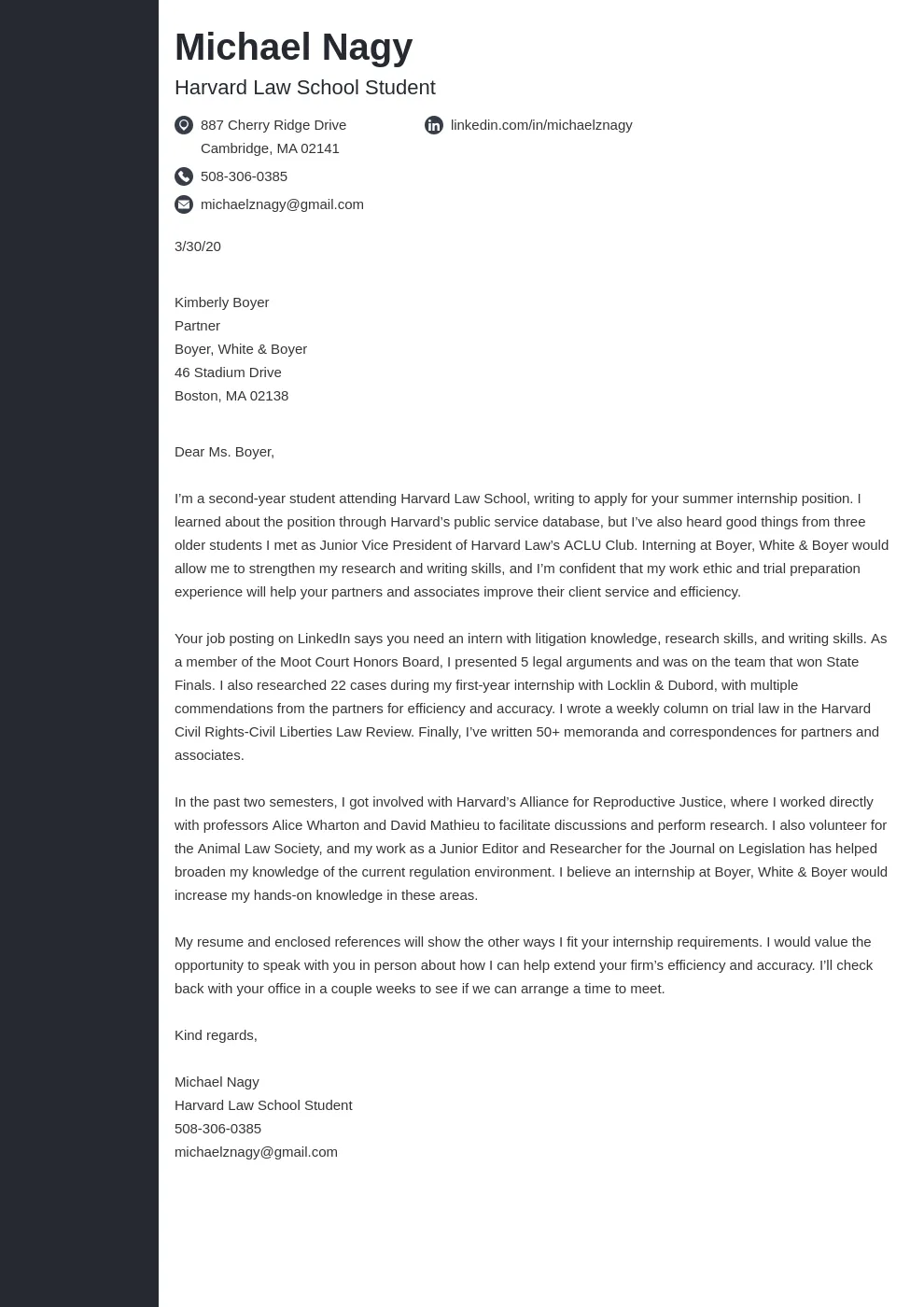
A successful cover letter typically includes several key components that work together to present a compelling case for your candidacy. A strong header with your contact information is essential. The opening paragraph should immediately grab the reader’s attention, stating your purpose and demonstrating your enthusiasm. The body of the letter should then highlight your relevant skills and experience, providing specific examples and quantifying your achievements whenever possible. It’s also important to express your passion for law and your genuine interest in the firm, and to show how you can contribute to their team. The closing paragraph should reiterate your interest and include a clear call to action, such as requesting an interview.
Your Header and Contact Information
Your header should include your full name, address, phone number, and professional email address. Ensure your email address is professional; avoid using nicknames or casual language. The date of the letter and the law firm’s contact information (hiring manager’s name, title, law firm’s name, and address) should follow. Accuracy is crucial here; a mistake in the contact information can send the wrong message, suggesting a lack of attention to detail – a trait highly valued in legal professionals. If you can’t find the hiring manager’s name, it’s acceptable to address the letter to “Hiring Manager” or “Recruiting Department.”
The Opening Paragraph Grab Their Attention
The opening paragraph sets the tone for your entire cover letter. Start by stating the specific position you are applying for and where you found the job posting. Then, immediately grab the reader’s attention by expressing your enthusiasm for the internship and the law firm. You might briefly mention something specific that attracted you to their firm, such as their reputation in a particular area of law or their commitment to a specific cause. Avoid generic phrases like “I am writing to express my interest…” Instead, be direct, confident, and show your understanding of the firm’s values.
Expressing Your Interest
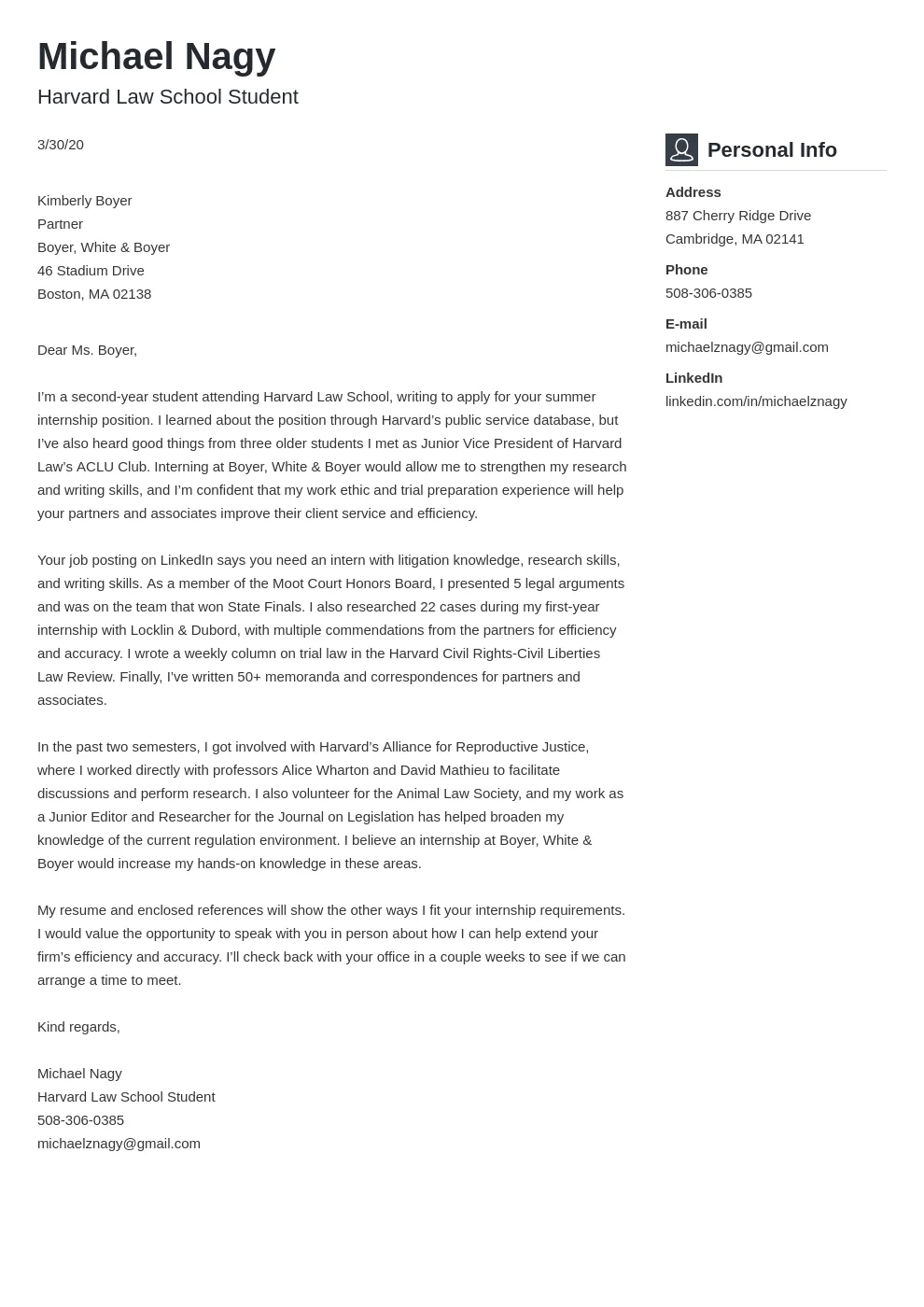
Demonstrate your genuine interest in the law firm and the legal field. Explain why you are specifically drawn to this particular firm. Did you attend a networking event where you learned about the firm’s work? Have you researched their cases and found their approach intriguing? Highlighting specific aspects of the firm that resonate with you demonstrates that you have done your homework and are not just sending out a mass application. Show that you understand their values, their areas of practice, and their unique position within the legal landscape. This level of detail helps your cover letter stand out.
Highlighting Relevant Skills and Experiences
The core of your cover letter should focus on demonstrating your relevant skills and experiences. Carefully review the internship requirements and identify the skills and experiences they are seeking. Use concrete examples from your academic, extracurricular, and professional experiences to illustrate how you have developed these skills. This is where you connect your resume with the job requirements, showing the hiring manager that you not only possess the necessary skills but have also demonstrated them in real-world situations. The more specific and tailored your examples, the more impactful your cover letter will be. This gives a clear picture of what you can bring to the table.
Skills to Showcase
Common skills that law firms seek in interns include research, writing, analytical thinking, attention to detail, and communication. Other valuable skills can include time management, teamwork, and proficiency in relevant software or legal databases. Tailor the skills you highlight to match the specific requirements listed in the internship posting. Provide specific examples of how you have utilized each skill. For instance, instead of stating “I have strong research skills,” you might say “In my role as a research assistant, I conducted in-depth legal research using Westlaw and LexisNexis, resulting in the discovery of key precedents that helped win the case.”
Relevant Experience
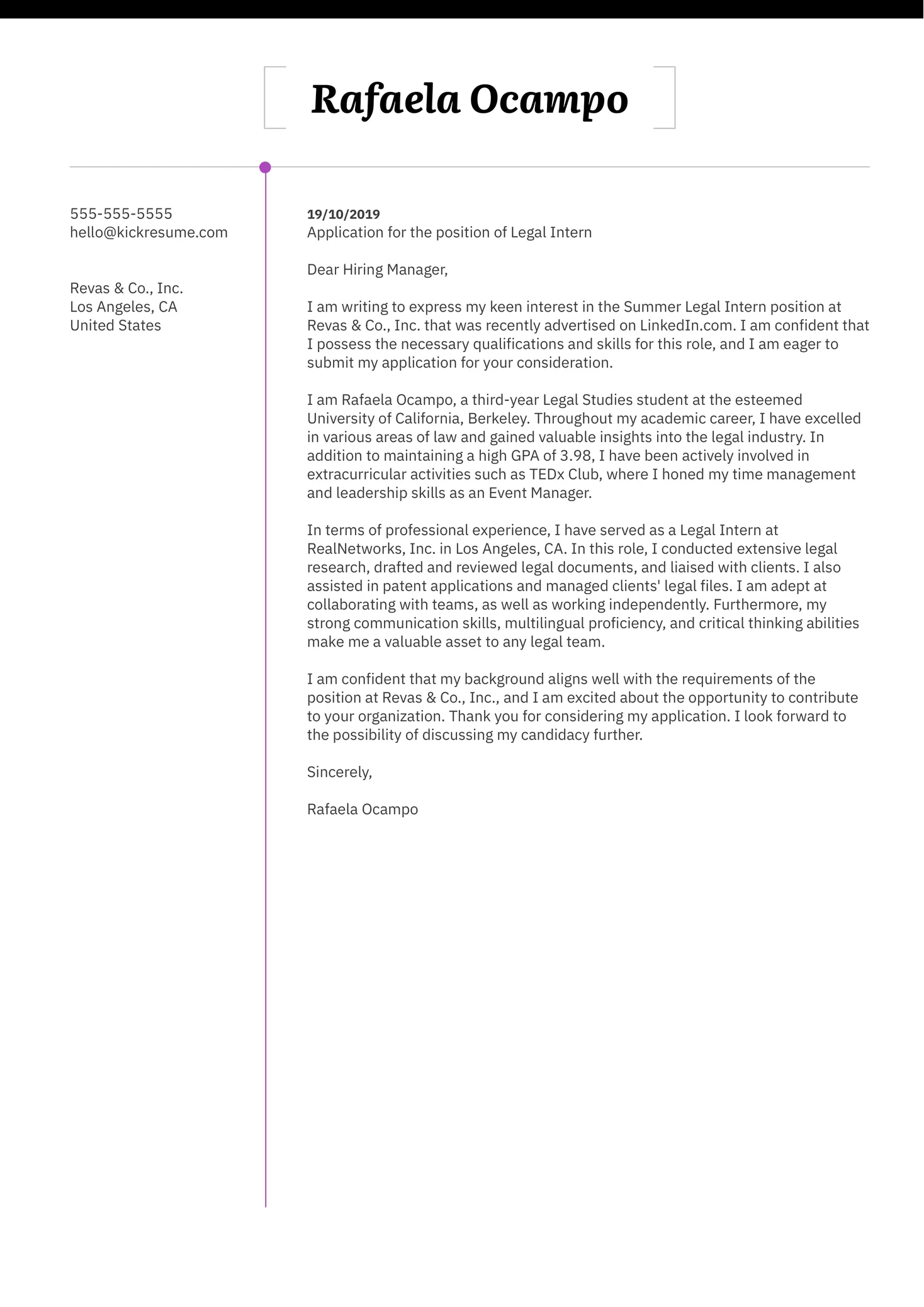
Highlight any relevant experiences, such as previous internships, legal clinics, volunteer work, or coursework. Describe your responsibilities and accomplishments in each role, focusing on the skills you developed and the contributions you made. If you lack direct legal experience, emphasize transferable skills from other experiences, such as leadership roles in student organizations or part-time jobs. Frame these experiences in a way that demonstrates how they have prepared you for the internship. For instance, a leadership role might showcase your ability to manage projects and work with a team. A part-time job could prove your ability to manage time and meet deadlines.
Quantifying Achievements
Whenever possible, quantify your achievements. Use numbers and data to demonstrate the impact of your work. For example, instead of saying “I improved efficiency,” you might say “I streamlined the document review process, resulting in a 20% reduction in processing time.” Quantifying your accomplishments provides concrete evidence of your abilities and makes your claims more credible. This shows the hiring manager the tangible results you can deliver. Even in seemingly non-quantifiable areas, you can find ways to use numbers. For example, “Successfully managed a caseload of 15 clients while maintaining a high level of client satisfaction.”
Demonstrating Your Passion for Law
Your cover letter should reflect your passion for law and your commitment to a legal career. Share why you are drawn to the legal profession and what motivates you. Briefly discuss your academic interests, relevant coursework, or any particular areas of law that interest you. This demonstrates your genuine enthusiasm and shows that you are not just looking for a job, but that you are invested in the field of law. This could also include your goals, aspirations, and any long-term career objectives in the legal field, all while maintaining a professional tone.
Researching the Law Firm
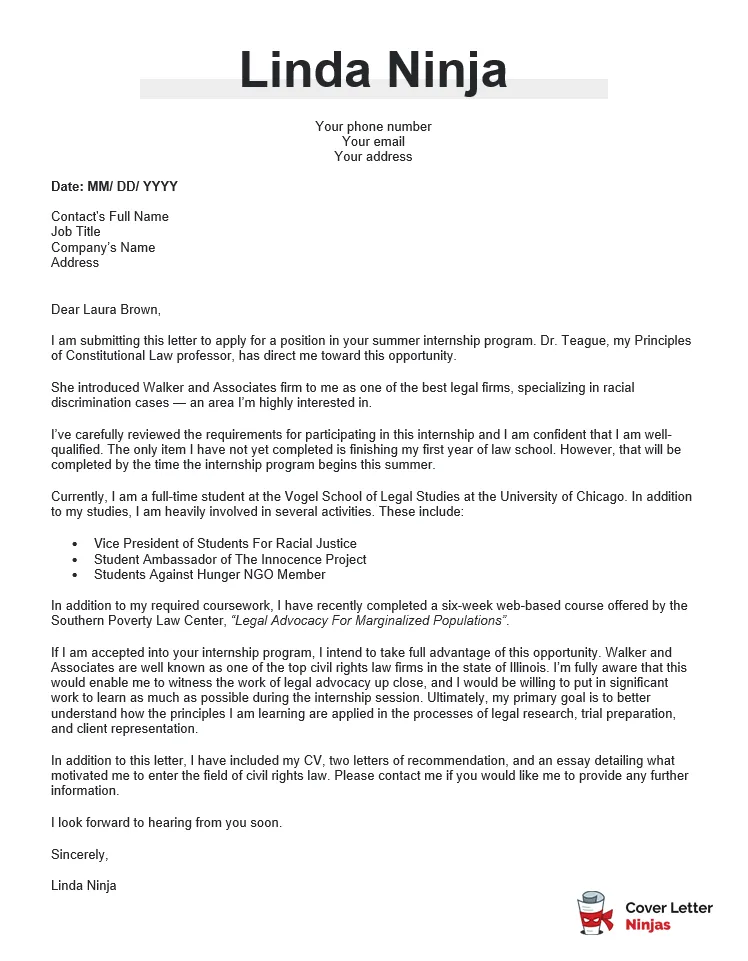
Thoroughly research the law firm before you begin writing your cover letter. Visit their website, read their news articles, and check their social media presence. Understand their areas of practice, their clients, their values, and their culture. Tailor your cover letter to reflect your understanding of the firm and how your skills and interests align with their work. This shows that you are truly interested in the specific firm and have not simply sent a generic application. Demonstrating this will set you apart from applicants who have not done the same. It’s essential to show that you fit their culture and understand their legal work.
Tailoring Your Letter
Avoid using a generic, one-size-fits-all cover letter. Customize your letter for each specific law firm and internship opportunity. Personalize your letter by addressing the hiring manager by name, if possible, and by referencing specific aspects of the firm that appeal to you. Tailoring demonstrates that you have taken the time to understand the specific needs of the law firm and are genuinely interested in the opportunity. This personalization makes your cover letter more engaging and memorable. Show that you’re not just sending out mass applications, but are truly dedicated to this firm.
The Closing Paragraph: Call to Action
In your closing paragraph, reiterate your interest in the internship and express your gratitude for their time and consideration. Include a clear call to action, such as requesting an interview. Make it easy for the hiring manager to take the next step. Provide your contact information again and mention your availability for an interview. Ending on a positive, confident note, reinforces your enthusiasm and reinforces the action that you are hoping for. This will increase your chances of being remembered and considered for the position.
Proofreading and Formatting
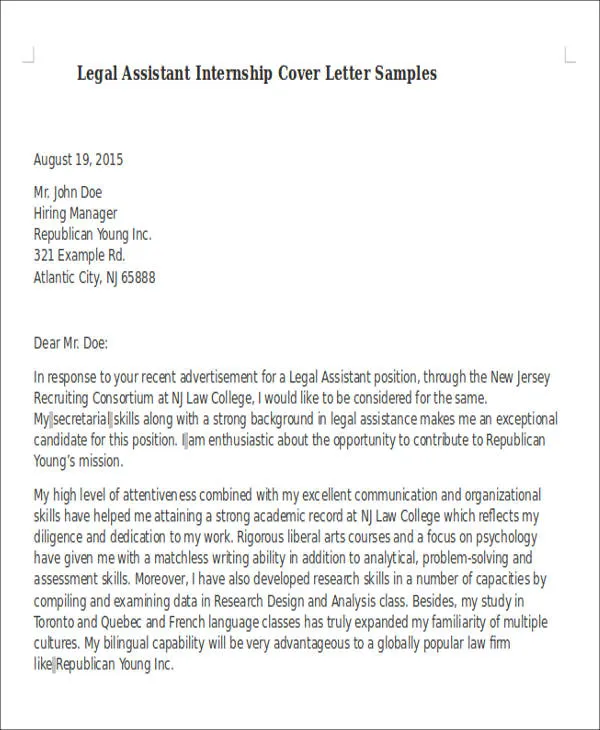
Before submitting your cover letter, meticulously proofread it for any grammatical errors, spelling mistakes, or typos. A polished, error-free cover letter reflects your attention to detail, which is a critical skill in the legal field. Ensure that your formatting is professional and easy to read. This includes using a clear font, appropriate margins, and consistent spacing. A well-formatted cover letter makes a positive impression and demonstrates your professionalism. Make sure the letter is easy on the eyes and that the information is presented logically. A formatting mistake can be easily avoided if the candidate uses proofreading checklists.
Formatting Your Cover Letter
Use a professional font, such as Times New Roman, Arial, or Calibri, in a size between 10 and 12 points. Use standard 1-inch margins and single-space your text within paragraphs, while double-spacing between paragraphs. Left-align your text and avoid using justified alignment, which can create uneven spacing. Ensure consistency throughout the document. Use bolding and italics sparingly, and only to emphasize key points. Your overall goal is to create a visually appealing document that is easy to read.
Proofreading Checklist
After writing your cover letter, utilize a proofreading checklist to catch any errors you might have missed. Check for spelling, grammar, punctuation, and capitalization errors. Ensure that all names, dates, and contact information are accurate. Verify that your sentences are clear, concise, and well-structured. Check that the tone of your letter is appropriate and professional. Read your letter aloud to catch any awkward phrasing or flow issues. It’s always best to have someone else proofread your letter as a fresh pair of eyes can often catch errors that you’ve overlooked.
Tips for Success
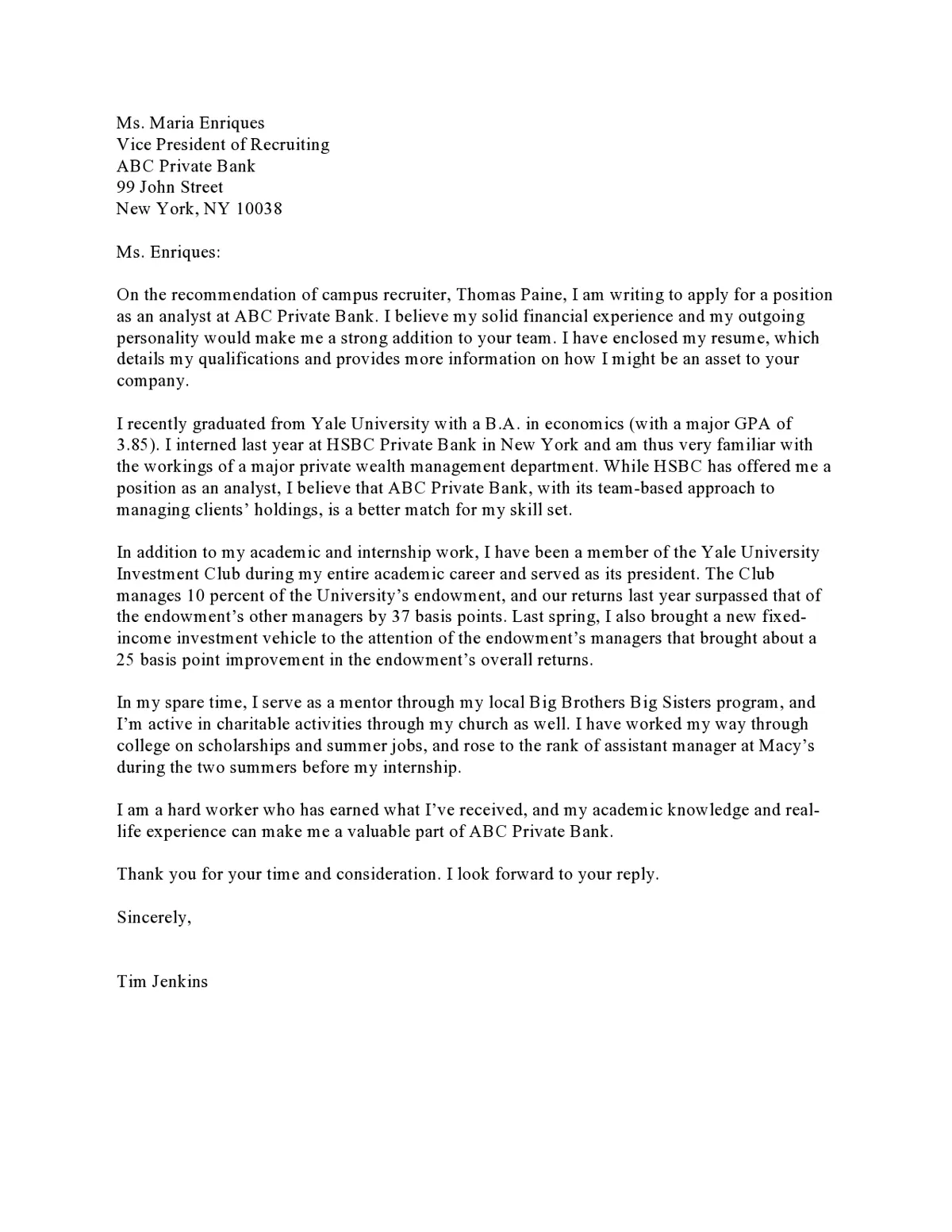
Start early and give yourself plenty of time to write and revise your cover letter. Gather all the necessary information about the law firm and the internship requirements. Seek feedback from career advisors, professors, or experienced legal professionals. Tailor your cover letter to each specific opportunity. Keep your cover letter concise and to the point, ideally within one page. Highlight your achievements and quantify your results whenever possible. Proofread meticulously for any errors. Be confident and enthusiastic in your writing. Remember that the cover letter is your opportunity to sell yourself and demonstrate your suitability for the internship. The more effort you put into it, the greater your chances of success.
Following Up
After submitting your cover letter and resume, it’s acceptable to follow up with the law firm to reiterate your interest in the internship and to inquire about the status of your application. Send a brief, polite email to the hiring manager or the contact person listed in the job posting. A week or two after the deadline, send a follow-up email. Briefly restate your interest in the position, reference your application, and politely ask if they require any additional information. This shows your continued enthusiasm and initiative. However, avoid being overly persistent or harassing. If you haven’t heard back after a reasonable time, consider it a rejection and move on.
Common Mistakes to Avoid
Avoid generic cover letters that are not tailored to the specific law firm or internship. Don’t use clichés or overly formal language. Avoid grammatical errors and typos. Don’t exceed the recommended length of one page. Don’t include irrelevant information. Avoid negative language or complaining about previous experiences. Don’t forget to proofread! Avoid exaggerating your accomplishments or misrepresenting your skills. Do not send the wrong cover letter. Following these recommendations can significantly improve the quality of your cover letter, increasing your chances of receiving an interview and securing a law firm internship.
